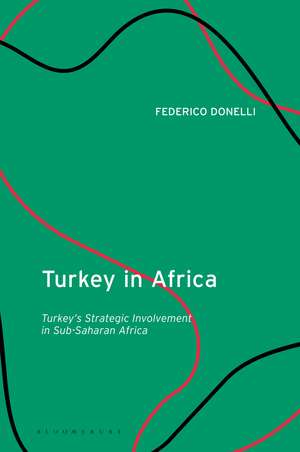Turkey in Africa: Turkey's Strategic Involvement in Sub-Saharan Africa
Autor Dr Federico Donellien Limba Engleză Hardback – 7 apr 2021
| Toate formatele și edițiile | Preț | Express |
|---|---|---|
| Paperback (1) | 197.42 lei 6-8 săpt. | +72.63 lei 6-12 zile |
| Bloomsbury Publishing – 21 sep 2022 | 197.42 lei 6-8 săpt. | +72.63 lei 6-12 zile |
| Hardback (1) | 568.71 lei 6-8 săpt. | |
| Bloomsbury Publishing – 7 apr 2021 | 568.71 lei 6-8 săpt. |
Preț: 568.71 lei
Preț vechi: 815.90 lei
-30% Nou
Puncte Express: 853
Preț estimativ în valută:
108.84€ • 112.76$ • 90.83£
108.84€ • 112.76$ • 90.83£
Carte tipărită la comandă
Livrare economică 21 martie-04 aprilie
Preluare comenzi: 021 569.72.76
Specificații
ISBN-13: 9780755636976
ISBN-10: 075563697X
Pagini: 224
Dimensiuni: 156 x 234 x 20 mm
Greutate: 0.49 kg
Editura: Bloomsbury Publishing
Colecția I.B.Tauris
Locul publicării:London, United Kingdom
ISBN-10: 075563697X
Pagini: 224
Dimensiuni: 156 x 234 x 20 mm
Greutate: 0.49 kg
Editura: Bloomsbury Publishing
Colecția I.B.Tauris
Locul publicării:London, United Kingdom
Caracteristici
Increasingly growing geopolitical powers such as China are exerting direct and indirect influence over Africa and its resources. Focus of study is usually on China, India, Russia so the focus on Turkey is highly original
Notă biografică
Federico Donelli is Postdoctoral Research Fellow and Teaching Assistant in Political Science and International Relations at the University of Genoa, Italy.
Cuprins
IntroductionI. The Relevance of Africa in a multipolar and decentralized system: II. Turkey-Africa relations: a historical perspective:III. Turkish rapprochement to Sub-Saharan Africa (2002-11): IV. The Somali crisis and the emergence of Turkey's humanitarian oriented policy: V. Turkey's way for development: the Ankara Consensus: VI. Operationalizing Turkey's multitrack policy: VII. The Gülen Movement in Africa: From Turkish Transnational Assets to Anti-State Lobby: Conclusions Index
Recenzii
[H]ighly recommended for academics and students seeking a greater knowledge of Turkey's policies in Africa as middle powers are assuming a greater role in diplomatic and economic activity on the African continent. The book is especially informative regarding the Horn of Africa and comprehensively deals with Turkish motivations, modes of operation, and perspectives regarding the continent of Africa in general.
Federico Donelli's book Turkey in Africa represents a successful overarching attempt to analyze the Turkish strategic involvement in sub-Saharan Africa ... The recommended reading audience, thanks to an academic but accessible style, embraces a wide number of people starting from the government level, policymakers, scholars, reaching students approaching this topic for the first time to the passionate reader.
As a whole, the book presents an introductory portrait of Turkey's actions and decision-making in the environment of the new division of Africa. This is an ideal read for those who wish to know the relations between that specific region sub-Saharan Africa and the political, economic and social objectives of Turkey, with an overview of its motives and ideas in a cohesive and fluid narrative. (A Bloomsbury Translation)
The contribution of these two works is undeniable, since they fill some gaps in the analysis of these relationships, and instruct anyone who wishes to deepen his knowledge of Turkish trajectories in Africa.
The book offers a fascinating study that will lead to future academic exploration in this field.
Federico Donelli has written a fascinating, authoritative exploration of the evolution of Turkish involvement on the African continent. Anchored in a sophisticated neoclassical realist theoretical framework, Turkey in Africa delivers a nuanced, sweeping analysis of Ankara's rapidly growing political, economic and humanitarian interventions in Africa. This is an important contribution to the emerging literature on Turkish foreign policy and on the new terms of engagement for Middle Eastern powers in Africa.
Donelli's book will be essential reading for those seeking to understand Turkey's role in Africa, especially in the Horn of Africa, where its influence has increased dramatically in the last decade. Engaging with existing literature and brining years of observations to bear, Donelli also-crucially-analyses the drivers of Turkey's foreign policy and the changes in Africa's place among Ankara's priorities.
Federico Donelli's book Turkey in Africa represents a successful overarching attempt to analyze the Turkish strategic involvement in sub-Saharan Africa ... The recommended reading audience, thanks to an academic but accessible style, embraces a wide number of people starting from the government level, policymakers, scholars, reaching students approaching this topic for the first time to the passionate reader.
As a whole, the book presents an introductory portrait of Turkey's actions and decision-making in the environment of the new division of Africa. This is an ideal read for those who wish to know the relations between that specific region sub-Saharan Africa and the political, economic and social objectives of Turkey, with an overview of its motives and ideas in a cohesive and fluid narrative. (A Bloomsbury Translation)
The contribution of these two works is undeniable, since they fill some gaps in the analysis of these relationships, and instruct anyone who wishes to deepen his knowledge of Turkish trajectories in Africa.
The book offers a fascinating study that will lead to future academic exploration in this field.
Federico Donelli has written a fascinating, authoritative exploration of the evolution of Turkish involvement on the African continent. Anchored in a sophisticated neoclassical realist theoretical framework, Turkey in Africa delivers a nuanced, sweeping analysis of Ankara's rapidly growing political, economic and humanitarian interventions in Africa. This is an important contribution to the emerging literature on Turkish foreign policy and on the new terms of engagement for Middle Eastern powers in Africa.
Donelli's book will be essential reading for those seeking to understand Turkey's role in Africa, especially in the Horn of Africa, where its influence has increased dramatically in the last decade. Engaging with existing literature and brining years of observations to bear, Donelli also-crucially-analyses the drivers of Turkey's foreign policy and the changes in Africa's place among Ankara's priorities.
